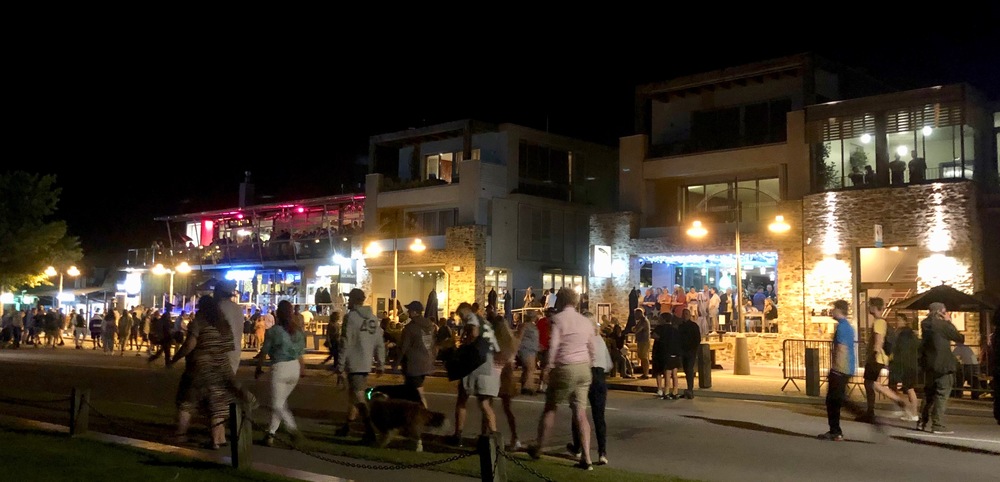Wanaka police returning to the beat
Sue Wards
04 November 2020, 5:06 PM
 Sergeant Darren Cranfield and his colleagues will be more visible on Wanaka’s streets.
Sergeant Darren Cranfield and his colleagues will be more visible on Wanaka’s streets.Locals can expect to see more police officers on the beat as the Wanaka police take a stronger focus on community policing and crime prevention.
Some of the $300M the government committed in 2018 to boost frontline numbers - in a bid to improve community safety and target organised crime - has now found its way to Wanaka.

Senior sergeant Miriam Chittenden told the Wanaka App a new position of crime and alcohol harm prevention sergeant has been created.
The Wanaka App sat down with newly promoted Sergeant Darren Cranfield, whom Miriam described as “very engaged with the community” to find out more about his new role.
Darren has been with the Wanaka police for five years, and says Wanaka is “hugely different” to his previous district of Christchurch Central, where he worked for 15 years.
A new crime prevention team
Darren will be responsible for two more frontline staff (to “bring numbers back up to what they should be”), and a further two crime prevention officers will be added to his team: one in 2021 and one in 2022, as part of the internal ‘Project Evolve’.

Much of Wanaka’s police work focuses on crime caused by alcohol, Darren said.
Youth officer Senior Constable Phil Vink will also operate within the crime and alcohol harm prevention team.
Darren said sergeant Aaron Nicholson previously held a crime prevention role, but since he resigned in 2018 there has been a gap. Now Wanaka has more resources to focus on prevention.
“The focus will be on all areas of risk,” Darren said. “We want to get back to community policing, which has been missing for some time. When we’re out and about it’s really well received.”
Alcohol: The main culprit
Alcohol harm is associated with the vast majority of Wanaka police work, Darren said.
One of his priorities is to build on the relationship with hotels in the township, and increase police visibility around the hotels and the streets.
“The prevention team will give us the resources,” he said.
“Our risk periods for disorder and assaults increases later in the evenings and usually after the consumption of too much alcohol.

The prevention unit will be working on a youth drinking prevention plan.
“It is manageable - we haven’t got a huge number of problematic hotels. We’re reasonably lucky.”
However, Wanaka also hosts “a huge amount of weddings”, which results in busloads of people arriving in the CBD at night. This is still happening post-COVID, although not to the same extent, Darren said.
But it’s not just the hotels, Darren said, youth drinking is also a high priority for the police.
Youth behaving badly
The mix of youth, alcohol, drugs and New Years’ revelry has been a concern for some years, with Wanaka Community Board member Ed Taylor in 2018 calling the combination a “potential powder keg”.
A meeting was held in March with Wanaka police, representatives from volunteer group Red Frogs, Wanaka Alcohol Group (WAG), Kahu Youth, Queenstown Lakes District Council (QLDC) and others to look at the ongoing challenge of managing the behaviour of young people around alcohol during the New Year’s period.
“The influx of young people from outside the district meant that at times there were significant numbers congregating [over New Year’s],” a QLDC spokesperson said.
Darren said the police will be working with the council, Kahu Youth, and other agencies to develop a youth drinking prevention plan for the next three to four years.
Darren cited Christchurch’s Christmas in the Park as a family friendly, inclusive event which shows it is possible to celebrate New Year without harm.
“There’s no reason we can’t manage it,” he said.
“We’re trying to educate parents that sending their kids into town alone and with alcohol is not OK.”
Darren has some clear advice for Wanaka parents: Have tight boundaries with your children and know where they are staying or who they will be associating with. Talk to the parents of the other children and make sure they are actually staying with them. There is a trend for youths to sneak out late at night. He says an effective prevention strategy parents can employ is turning off wifi and not allowing children to have devices in their bedrooms.
Preventing family harm
The new prevention team will also be responsible for managing family harm incidents.
Family harm “spikes occasionally” in this area, Darren said, but the police found that the COVID alert level restrictions were “surprisingly quiet” for those incidents.
Darren and his team are meeting with external agencies on a regular basis to ensure troubled families get the support they need.
It’s about how we manage it after the initial response ” he said.
And again, alcohol is normally the contributing factor.
“I would say most family harm incidents involve alcohol,” Darren said.
Drink driving: ‘A huge problem’
“Drink drivers - that’s a huge problem,” Darren said. “We seem to have more than in other regions.”
He speculates that could be because taxis are reasonably limited, and it would be expensive to take a taxi from Wanaka to outlying communities such as Hāwea. But, Darren said: “There’s been a bit of a culture here of drink driving.”
The prevention team won’t be dealing with the issue in the “old, traditional way”, Darren said.
All the road policing units in the nearby district, including the booze bus, will be supporting Wanaka police in ‘Operation Lift’ this summer.
Police will be stopping every vehicle in “unexpected locations”.
“If you have a couple of beers you’re borderline. People shouldn’t have to be told. They just continue to run the risk,” he said.
“The public expect a level of service in this area, so be warned, we aren’t going to disappoint them”.
PHOTOS: Wanaka App



